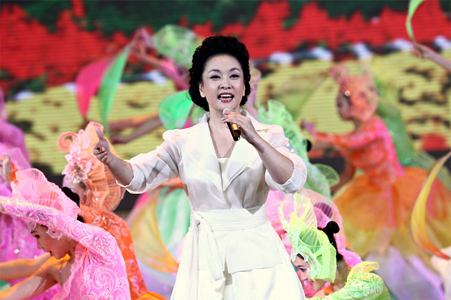Guest post by Michael Cole
When asked, “Who is Xi Jinping?” a Beijing wit might respond, “He is Peng Liyuan’s husband.”
![]()
Xi’s long slog to the top post in China’s Communist Party (中国共产党) was achieved by quiet service and loyalty to the right power players. It was a predictable course pursued by many ambitious scions of powerful Chinese families, with one surprising difference: Xi is married to Peng, one of China’s favorite superstar singers.
In March, amid military pageantry at Tiananmen Square, in the shadow of the Forbidden City’s imposing gatehouse and the famous portrait of Mao with the Mona Lisa smile, Peng Liyuan ascended to the top of the Communist Party leadership dais with her husband, the new president. Soldiers marched, generals saluted, and the sun shone on a rare blue-sky day while Peng smiled and waved. In China, as it is everywhere, a warm personality stands out and gives heart. Peng was an uncommonly elegant presence among the dowdy leadership, and everyone noticed.
In the following weeks, headlines tinged with hopefulness have chronicled President Xi Jinping’s commitment to punish corruption, maintain and control China’s economic growth, and even curb the dangerous effects of pollution. His success will take years to assess, but his tenure is already proving to be a stylish departure from his predecessor’s as he travels the world and appears on television with his wife.
During trips to Russia, Tanzania, and Congo, she has received praise for her personal style. Stepping off an airplane in Moscow in March, she wore a trim black trench coat cinched at the waist, and carried a smart leather bag, both made by the highbrow but homegrown Chinese label Exception de Mixmind. In Tanzania, she wore a chic skirt-suit in peach brocade and carried a small leather purse made in Chengdu. Appearing on television in Beijing, she wore a silk qipao, a traditional tunic dress with a high collar. Her look is both elegant and distinctly Chinese, and her manner warm but formal.
Although the wife of a Chinese president has no official position, Peng Liyuan’s popularity is making her truly China’s first lady. Her presence at public events makes her unique, as most premiers’ wives have remained conspicuously discreet. When former president Hu Jintao visited Washington, DC to attend a state dinner at the White House, his wife Liu Yongqing was notably absent, but Peng’s image makes her a potential game-changer. The New York Times compared her to Jacqueline Kennedy Onassis; London’s Daily Telegraph compared her popularity to the “Lady Katherine effect;” and Weibo fan groups proliferate. In the ultimate sign of China’s approval, the massive retail site Taobao – China’s eBay – is flooded with copies of her popular clothing choices.
Critically, Peng arrives on the scene at a moment when China’s Communist Party and government need a new face to show the public, despite the fact that they form a system that is adamantly, and sometimes violently, opposed to change. Chinese politicians do not like to make waves. Senior Party members’ tight-lipped discretion keeps generations of political secrets, and their unfashionable uniform of red ties and square black suits masks immense wealth. Observers speculate endlessly about rivalries within the Party, but officials are united in their mission to maintain appearances.
The Communist Party’s stale old images have little appeal in media-saturated modern China. Elderly Chinese tell folk stories of Mao’s personal warmth and penchant for wordplay, but few want another leader like him. State companies produce grand dramas about well-known revolutionaries beloved for idealism and selflessness, but the cinemas sit empty. Global news outlets have dissected the government’s trust deficit amid news of corruption and abuse, but they arguably miss the point: modern Chinese peoples’ cynicism masks their unmet need for leaders who make them proud, and who represent their best selves. China wants a hero.
By some accounts, the Party’s image problem is rapidly becoming a legitimacy crisis. Riots break out over problems such as economic inequality, labor abuse, and pollution, but leaders lack both inclination and credibility to address the issues, and instead use violence. “Netizens” on Weibo and Renren — the Chinese Twitter and Facebook, respectively — spread news of officials’ corruption faster than government censors can ‘harmonize’ their posts. In magazines, social media, and conversation, commercialism rules and ostentation wins the day. Pop stars and athletes receive adulation while officials struggle to evade ridicule.
In a system that thrives on stability — or harmony, as the Chinese say — Peng Liyuan presents an opportunity to try a new approach. Personally, she now occupies the role of a much-loved first lady, but it’s unknown who her role models might be. Chinese and international observers are watching for signs of how she understands her role, how she intends to use their unprecedented good will, and whether her image indicates changes in how the top leadership will behave and relate to the public. Continue reading Glamorous singer Peng Liyuan reshapes role of China’s first lady
